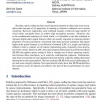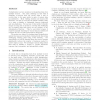1047 search results - page 124 / 210 » Learning the required number of agents for complex tasks |
BMVC
2010
13 years 5 months ago
2010
Recently, sparse coding has been receiving much attention in object and scene recognition tasks because of its superiority in learning an effective codebook over k-means clusterin...
DAGM
2009
Springer
14 years 2 months ago
2009
Springer
High-speed smooth and accurate visual tracking of objects in arbitrary, unstructured environments is essential for robotics and human motion analysis. However, building a system th...
ISNN
2007
Springer
14 years 2 months ago
2007
Springer
Normal fuzzy CMAC neural network performs well because of its fast learning speed and local generalization capability for approximating nonlinear functions. However, it requires hu...
ATAL
2010
Springer
13 years 9 months ago
2010
Springer
Coordination within decentralized agent groups frequently requires reaching global consensus, but typical hierarchical approaches to reaching such decisions can be complex, slow, ...
KDD
2002
ACM
14 years 8 months ago
2002
ACM
Deduplication is a key operation in integrating data from multiple sources. The main challenge in this task is designing a function that can resolve when a pair of records refer t...


